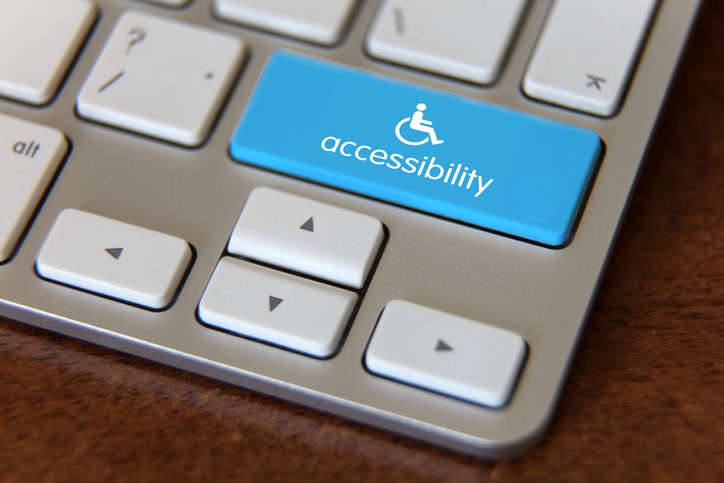Local governments and the services they offer to the public exist to serve citizens. According to the U.S. Census Bureau, nearly one in five citizens lives with some type of disability. Slightly more than 18% of U.S. citizens have some type of disability that impairs their online access. These citizens reside within your local government boundaries and they need access to your local government website to get information, to work and to communicate. Accessibility laws mandate certain accessibility law standards that assure that governments provide web content that every citizen can easily navigate and understand. An online transparency portal through Community by Diligent offers all the features that allow people with disabilities to access information about their local government and engage with it on a regular basis.
What Do Accessibility Laws and Compliance Mean in the U.S.?
The Americans with Disabilities Act (ADA), which requires all governmental entities to provide equal opportunities and prohibit discrimination in employment, government services, public accommodations, facilities and transportation, was passed in 1973. The law applies to physical access to buildings and facilities. Section 508 applies specifically to eliminating technology barriers for people with disabilities.
U.S. Local Governments Must Comply With ADA's Physical and Transportation Mandates
ADA accessibility laws state that governments can't discriminate against individuals with disabilities in ways that prevent them from full and equal enjoyment of the goods, services, facilities or accommodations of any place of public accommodation by any person who owns, leases or operates a place of public accommodation.
Public accommodations refer to most places that provide lodging, recreation, transportation, education and dining. The law also applies to businesses that provide dining, retail, care providers and public displays.
The ADA standards apply to all government or public buildings constructed on or after March 12, 2013, unless the standards are structurally impractical. Public accommodations must provide clear paths of travel to restrooms, telephones and drinking fountains, including providing a clear path for wheelchairs. In addition, if a section of government or public facility serves a primary function, such as the dining areas of cafeterias, meeting rooms, conference centers and offices where the day-to-day work of the facility is done, they must comply with ADA standards.
What Are the Accessibility Law Requirements for U.S. Local Governments?
Section 508 in the law applies to all federal government websites and the sites of any organization that does business with the federal government, or that accepts federal funds. Most local governments meet this criterion and they're legally required to comply with Section 508.
At present, Section 508 applies only in the United States. This standard is dated and will be replaced by an international standard in the future.
Currently, there are four basic principles that apply to people with disabilities that enable them to access local government websites, as follows:
- Website content must be perceivable.
This means that local governments must add content to their websites and present interface components in ways such that they're able to perceive the content. In other words, the content can't be invisible to individuals with disabilities. Anyone viewing the site should be able to be aware that the content exists.
- Website content must be operable.
It only makes sense that citizens should be able to operate the website. This means they should be able to navigate the various parts of the website. A disability-friendly website will help them find the information they're looking for quickly and enable them to interact with it without undue problems.
- Website content must be understandable.
Accessibility and compliance for local governments require government websites to make it possible for disabled individuals to comprehend the information on the website. Understandability refers to ensuring that they can understand and comprehend how to navigate the information, present the content in an understandable way, and allow disabled individuals to interact with the content similar to non-disabled citizens.
- Website content must be robust.
The final standard has to do with creating robust web content. This means that the content on local government websites must be such that a wide variety of citizens can reliably interpret the content. Robust content refers to adding software programs that provide assistive technologies. The law also requires local governments to maintain their websites in such a manner that they remain accessible as technologies advance.
How Community by Diligent Helps Local Governments Comply With ADA Accessibility Requirements
A surefire way to ensure compliance with accessibility law requirements is by using software that's specifically designed for local governments, such as the online transparency portal with Community by Diligent. The portal is a website that attaches seamlessly to the local government's webpage. Local citizens can pull up the website any time of day or night and receive the most current information because it gets updated in real time. The online transparency portal allows citizens access to the council's agenda, the board packet and supporting items. The portal is user-friendly, completely accessible and meets the four basic principles that allow people with disabilities to access local government websites as listed above.
The portal offers a searchable database of public records and meeting documents. In fact, citizens can set up their account to receive agendas automatically via email. The portal also allows citizens to access public request forms such as Freedom of Information Act (FOIA) requests directly from the Clerk's Department.
Community by Diligent offers audio and video accessibility to council meetings so that those with hearing and vision impairments can access the transcripts of council meetings.
For example, citizens can use the online transparency portal to view council meetings online in real time or they can find the recorded versions on YouTube. The software gives clerks the ability to use closed-captioning to generate text automatically and to edit it prior to publishing it, which complies with accessibility laws.
Clerks can also trim the beginning and end of council meeting videos so that citizens get exactly the content they need. Videos appear in HD and have 360 capability, so citizens can get a clear viewing of council meetings in their entirety. Citizens who choose to view council meetings using tablets or mobile phones can start and stop live webcasts at any juncture of the meeting.
Clerks can also add time-stamping notes to the video to link to agendas and minutes.
Community by Diligent is committed to offering software solutions for local governments that continually comply with legal standards for accessibility and compliance for people with disabilities on an ongoing basis. After all, accessibility is a key component of civic engagement for all citizens.





